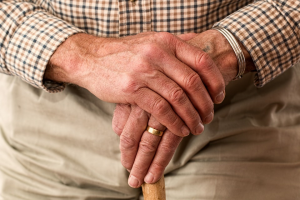The Swedish health magazine “Naturligt om hälsa” which is published four times a year, has previously brought an interview with a young man suffering from Parkinson’s disease and what he has done in order to improve his quality of life. In the latest autumn edition the journal features yet another article about a man living with this disease. The two men are unanimously saying that they benefit greatly from taking supplements of coenzyme Q10.
Len Bårdsen with a past in the health food industry is a hale and hearty Norwegian of 77 years. He lives with his wife Lena in Sweden’s sixth largest city Örebro. In 1995, Len was initiator of the creation of the Health Sector Suppliers Association in Norway. It was a time when the health sector was on the rise, and Len was very active on several fronts to create a stable organization.
In 2004, Len was examined by a young Norwegian physician, because among other things he experienced stiffness in some joints, which led to a diagnosis of depression. Len was immediately aware that this diagnosis was wrong as he had felt depressed, but had always worked to get the best out of difficult situations – not least in the years that as a technician and engineer in South Africa, which his wife can confirm.
Therefore, they continued to take samples after the initial diagnosis, and in 2007 Len was diagnosed with Parkinson’s disease. Although it was a hard blow, Len did not give up. He began reading about the disease and among other things he came across an American article about a study in which supplements of Q10 had shown positive effects on Parkinson’s disease.
The article made Len curious, and he wanted to try it. He already knew about Q10 from the time in the health food industry, but not in connection with Parkinson’s disease. Len started to take Q10 every day.
The effect became apparent. Today, Len sees himself as positive evidence of the impact of Q10, although he also exercises, eats healthy and sometimes takes other supplements.
Similar experiences
Gabriel Knoll was diagnosed with Parkinson’s disease only 27 years old. He is now 34 years. His biggest problem has been trouble with his sleep, resulting in fatigue, being more inclined to stress and making it more difficult to structure his his everyday life. In addition, there are the characteristic symptoms of rigidity, tremor and difficulty in movement.
Gabriel also read that Q10 could improve the quality of life for people with Parkinson’s disease. He also decided to try it and took 200 milligrams a day. After a while, he felt as if he came out of a fog and he got better.
He would not go so far as to call Q10 a miracle cure, but he feels that he has more energy and that it is a good supplement to his medication for Parkinson’s disease.
Facts about Parkinson’s disease
Parkinson’s disease occurs in one percent of the population. It is most often seen in elderly people over 70 years. The symptoms develop slowly and often starts with a characteristic tremor in the hands. Later, the person’s movements is hampered and stiffness in muscles occurs and impaired balance.
These symptoms occur due to a progressive destruction of cells in the brain. In particular cells that produce the neurotransmitter dopamine. The disease is treated with Parkinson medicine, whose purpose is to increase the brain’s production of dopamine.There have been a beneficial effect from exercise in the form of resistance training and gait and balance training.
Source: Patienthåndbogen
Refs.
Gabriel kämpar på: http://www.naturligtomhalsa.se/parser.php?did=805:420
Att leva med Parkinson. Naturligt om hälsa 2016(3) p35.
Shults CW, et al. Effects of coenzyme Q10 in early Parkinson disease: evidence of slowing of the functional decline. Arch Neurol. 2002;59(10):1541-5.













